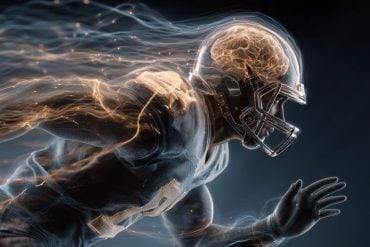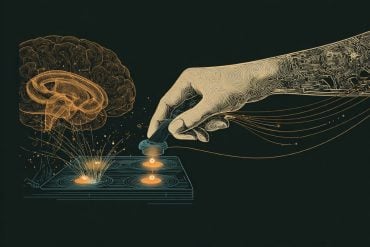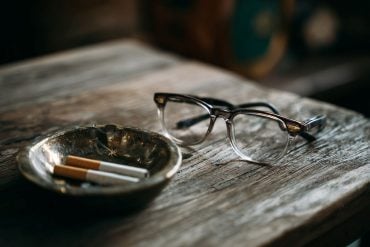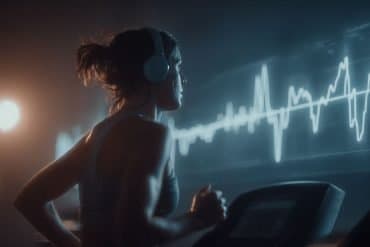Summary: Study finds people rate heavier fighters and those with higher anaerobic fitness as more likely to win an MMA match based on their facial features.
Source: Frontiers.
With the UFC set to appear in Prague for the first time this February 23rd, Czech researchers at Charles University have been getting into the fighting spirit.
“Recent research shows that humans are capable of inferring fighting ability from facial and body cues,” says Dr Vit Trebicky, lead author of a new study in Frontiers in Psychology. “But our latest findings suggest that when it comes to predicting the performance of Czech MMA fighters, you shouldn’t judge a book by its cover.”
Fighters with the highest anaerobic capacity tend to look the toughest
Trebicky and colleagues created standardized 360 degree photographs of 44 Czech MMA fighters, which were assessed on their perceived fighting ability by 94 university students (46 males).
“We compared these assessments with the fighters’ actual performance — MMA score, isometric strength, anaerobic performance and lung capacity — as well as physical characteristics like age, height and body composition.”
The MMA score consists of a fighter’s wins-to-all-fights ratio.
“In contrast to previous studies, we did not find any significant links between the actual and the perceived fighting ability,” Trebicky reports.
However, based on the headshots raters were to some extent able to predict physical performance-related characteristics.
“In general, heavier fighters and those with higher anaerobic performance were judged as more successful based on their facial features.”
A good big’un beats a good little’un
Trebicky suggests one reason why these results differed from previous studies might be the use of 360 degree standardized photographs, with neutral expressions and head positions.
“This is an important point because several earlier studies used downloaded static photographs of professional fighters, which varied in lighting conditions, head tilts and expressions that might bias inferences about fighting performance.”

Nevertheless, the researchers acknowledge the limitations of their approach.
“The popularity of MMA in the Czech Republic is increasing relatively slowly, so the fighters who participated in our study ranged from beginner amateurs to seasoned professionals. MMA score may provide a less accurate estimation of success rate in amateurs as they have generally had fewer fights.
“Reliability of the MMA score could also be affected by the way in which fighters are paired for matches, which is not a random process,” Trebicky concedes.
“Moreover, psychological characteristics such as personality, ability to cope with stress, or successful execution of techniques and other skills probably affect fighting ability and success. These factors, however, exceed the scope of the current study and remain to be investigated in future.”
Source: FrontiersPublisher: Organized by NeuroscienceNews.com.
Image Source: NeuroscienceNews.com image is credited to Frontiers in Psychology.
Original Research: Open access research for “Predictors of Fighting Ability Inferences Based on Faces” by Vít Třebický, Jitka Fialová, David Stella, Klára Coufalová, Radim Pavelka, Karel Kleisner, Radim Kuba, Zuzana Štěrbová, and Jan Havlíček in Frontiers in Psychology. Published January 15 2019.
doi:10.3389/fpsyg.2018.02740
[cbtabs][cbtab title=”MLA”]Frontiers”Can You Pick an MMA Winner By Studying Fighters’ Faces?.” NeuroscienceNews. NeuroscienceNews, 223 January 2019.
<https://neurosciencenews.com/mma-fighter-face-10626/>.[/cbtab][cbtab title=”APA”]Frontiers(2019, January 223). Can You Pick an MMA Winner By Studying Fighters’ Faces?. NeuroscienceNews. Retrieved January 223, 2019 from https://neurosciencenews.com/mma-fighter-face-10626/[/cbtab][cbtab title=”Chicago”]Frontiers”Can You Pick an MMA Winner By Studying Fighters’ Faces?.” https://neurosciencenews.com/mma-fighter-face-10626/ (accessed January 223, 2019).[/cbtab][/cbtabs]
Abstract
Predictors of Fighting Ability Inferences Based on Faces
Facial perception plays a key role in various social interactions, including formidability assessments. People make relatively accurate inferences about men’s physical strength, aggressiveness, and success in physical confrontations based on facial cues. The physical factors related to the perception of fighting ability and their relative contribution have not been investigated yet, since most existing studies employed only a limited number of threat potential measures or proxies. In the present study, we collected data from Czech Mixed Martial Arts (MMA) fighters regarding their fighting success and physical performance in order to test physical predictors of perceived fighting ability made on the basis of high-fidelity facial photographs. We have also explored the relationship between perceived and actual fighting ability. We created standardized 360° photographs of 44 MMA fighters which were assessed on their perceived fighting ability by 94 raters (46 males). Further, we obtained data regarding their physical characteristics (e.g., age, height, body composition) and performance (MMA score, isometric strength, anaerobic performance, lung capacity). In contrast to previous studies, we did not find any significant links between the actual and the perceived fighting ability. The results of a multiple regression analysis have, however, shown that heavier fighters and those with higher anaerobic performance were judged as more successful. Our results suggest that certain physical performance-related characteristics are mirrored in individuals’ faces but assessments of fighting success based on facial cues are not congruent with actual fighting performance.






